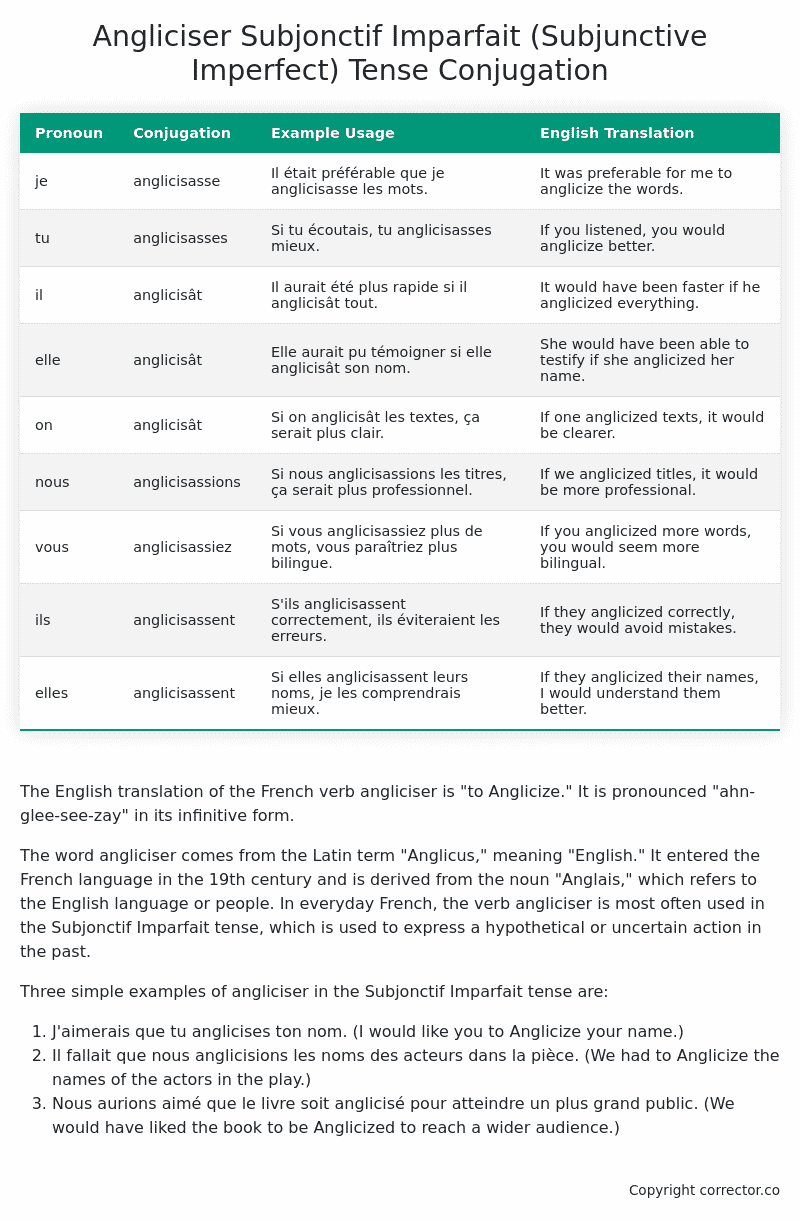Subjonctif Imparfait (Subjunctive Imperfect) Tense Conjugation of the French Verb angliciser
Introduction to the verb angliciser
The English translation of the French verb angliciser is “to Anglicize.” It is pronounced “ahn-glee-see-zay” in its infinitive form.
The word angliciser comes from the Latin term “Anglicus,” meaning “English.” It entered the French language in the 19th century and is derived from the noun “Anglais,” which refers to the English language or people. In everyday French, the verb angliciser is most often used in the Subjonctif Imparfait tense, which is used to express a hypothetical or uncertain action in the past.
Three simple examples of angliciser in the Subjonctif Imparfait tense are:
- J’aimerais que tu anglicises ton nom. (I would like you to Anglicize your name.)
- Il fallait que nous anglicisions les noms des acteurs dans la pièce. (We had to Anglicize the names of the actors in the play.)
- Nous aurions aimé que le livre soit anglicisé pour atteindre un plus grand public. (We would have liked the book to be Anglicized to reach a wider audience.)
Table of the Subjonctif Imparfait (Subjunctive Imperfect) Tense Conjugation of angliciser
| Pronoun | Conjugation | Example Usage | English Translation |
|---|---|---|---|
| je | anglicisasse | Il était préférable que je anglicisasse les mots. | It was preferable for me to anglicize the words. |
| tu | anglicisasses | Si tu écoutais, tu anglicisasses mieux. | If you listened, you would anglicize better. |
| il | anglicisât | Il aurait été plus rapide si il anglicisât tout. | It would have been faster if he anglicized everything. |
| elle | anglicisât | Elle aurait pu témoigner si elle anglicisât son nom. | She would have been able to testify if she anglicized her name. |
| on | anglicisât | Si on anglicisât les textes, ça serait plus clair. | If one anglicized texts, it would be clearer. |
| nous | anglicisassions | Si nous anglicisassions les titres, ça serait plus professionnel. | If we anglicized titles, it would be more professional. |
| vous | anglicisassiez | Si vous anglicisassiez plus de mots, vous paraîtriez plus bilingue. | If you anglicized more words, you would seem more bilingual. |
| ils | anglicisassent | S’ils anglicisassent correctement, ils éviteraient les erreurs. | If they anglicized correctly, they would avoid mistakes. |
| elles | anglicisassent | Si elles anglicisassent leurs noms, je les comprendrais mieux. | If they anglicized their names, I would understand them better. |
Other Conjugations for Angliciser.
Le Present (Present Tense) Conjugation of the French Verb angliciser
Imparfait (Imperfect) Tense Conjugation of the French Verb angliciser
Passé Simple (Simple Past) Tense Conjugation of the French Verb angliciser
Passé Composé (Present Perfect) Tense Conjugation of the French Verb angliciser
Futur Simple (Simple Future) Tense Conjugation of the French Verb angliciser
Futur Proche (Near Future) Tense Conjugation of the French Verb angliciser
Plus-que-parfait (Pluperfect) Tense Conjugation of the French Verb angliciser
Passé Antérieur (Past Anterior) Tense Conjugation of the French Verb angliciser
Futur Antérieur (Future Anterior) Tense Conjugation of the French Verb angliciser
Subjonctif Présent (Subjunctive Present) Tense Conjugation of the French Verb angliciser
Subjonctif Passé (Subjunctive Past) Tense Conjugation of the French Verb angliciser
Subjonctif Imparfait (Subjunctive Imperfect) Tense Conjugation of the French Verb angliciser (this article)
Subjonctif Plus-que-parfait (Subjunctive Pluperfect) Tense Conjugation of the French Verb angliciser
Conditionnel Présent (Conditional Present) Tense Conjugation of the French Verb angliciser
Conditionnel Passé (Conditional Past) Tense Conjugation of the French Verb angliciser
L’impératif Présent (Imperative Present) Tense Conjugation of the French Verb angliciser
L’infinitif Présent (Infinitive Present) Tense Conjugation of the French Verb angliciser
Struggling with French verbs or the language in general? Why not use our free French Grammar Checker – no registration required!
Get a FREE Download Study Sheet of this Conjugation 🔥
Simply right click the image below, click “save image” and get your free reference for the angliciser Subjonctif Imparfait tense conjugation!

Angliciser – About the French Subjonctif Imparfait (Subjunctive Imperfect) Tense
Formation
Common Everyday Usage Patterns
Interactions with Other Tenses
Subjonctif Présent
Indicatif Passé Composé
Conditional
Conditional Perfect
Summary
I hope you enjoyed this article on the verb angliciser. Still in a learning mood? Check out another TOTALLY random French verb conjugation!


